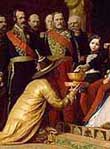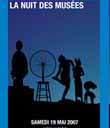| |
| |
IN THIS WEEK'S LETTER
This week we bring you Gerome's sumptuous painting of the Siamese Ambassadors visiting Napoleon III, the third European ‘Museums by Night' event, the Fondation's collection now in Minden, Napoleon on the best way to bring up young ladies, and a brief snapshot of the policeman con man Vidocq, whose long arm stretched over both empires…
Enjoy.

|
|
|
| |
THIS MONTH'S PAINTING
Reception of the Ambassadors from Siam at the Château de Fontainebleau, by Jean-Léon Gerome (1864)
This painting was an official commission by the Ministère d'Etat in commemoration of the reception of the ambassadors of the king of Siam, Rama IV, by Napoleon III and the Empress Eugénie in the great Salle de Bal in the Château de Fontainebleau, 27 June, 1861. The event not only marked the re-establishment of diplomatic relations (broken off since the 17th century) but also the signature of the treaty between France and Siam, 15 August, 1856.
Detail © RMN

|
|
|
| |
THE 3rd EUROPEAN “MUSEUM BY NIGHT”, 19 MAY
The increadingly popular « museum by night » event (1.2 million visitors last year), presided over by the Council of Europe, is to have its third ‘night out'. A wonderful occasion on which to see museums in a ‘different light'.
Poster 2007 © Photo: Hugues Reip with Neuflize Vie

|
|
|
| |
THE TREASURES OF THE FONDATION NAPOLEON IN MINDEN
Following from its ‘triumph' in Wesel, the exhibition entitled “Napoleon, Trikolore und Kaiseradler über Rhein und Weser”, including many treasures from the Fondation's collection has moved to the town of Minden until 1 July, 2007.
© Preussen-Museum NRW

|
|
|
| |
200 YEARS AGO
Ecouen, a model school for girls…
15 May, 1807: in the thick of the Polish Campaign and in the run-up to the battle of Friedland and the Treaty at Tilsit, Napoleon dictated a long note regarding the correct moral and intellectual education for the young girls at the Légion d'honneur school in Ecouen (about 20 kilometres north of Paris), which was to open in September 1807.
«The establishment at Ecouen must be handsome in all that concerns its monumental aspects, and it must be simple as regards the education it provides. Be sure not to follow the example of the Saint-Cyr school, where huge sums were spent but the young ladies were nevertheless badly educated.
The timetable should be the principal object of your attention. What are the girls at Ecouen to be taught? You must begin with the severest religious instruction.[…] Religion is an important matter in a public institution for young ladies. It is, despite what people say, the surest guarantee for mothers and husbands. Your education should provide us with girls who are believers not thinkers... […] The learning which is taught there should be almost exclusively that of the gospels. I do not want the women who come out of there to be delightful; I want them to be virtuous. […]
The pupils should be taught counting, writing, and the principles of their tongue, so that they will know how to spell [Napoleon's spelling was famously erratic, ed.]. They should be taught a little geography and history, but they should not be taught Latin or any foreign languages. .[…]
In general, they should, for three-quarters of the day, be given manual tasks; […] I want […] the girl who leaves Ecouen in order to become the head of a small family to be able to make dresses, to mend her husband's clothes, to make baby clothes, and to provide her beloved family with little pleasures […].
As for their dress, it must be uniform. Choose some everyday material and cut it nicely. […] .
As for their food, it cannot be too simple: soup, stew and small main course. Nothing more. […]
Dance should be taught for health of the pupils, but it must be happy kind of dancing and not classical ballet. I will allow them music, but only singing. .[…]
With the sole exception of the director, men should be excluded from this establishment. None should come within its grounds, for any reason whatsoever. […] My intention is that, given this report, the school at Ecouen should be run according to a rule as strict as that for a convent of nuns …
(Correspondance n°12585, Finkenstein 15 May, 1807)
150 YEARS AGO
On 15 May, 1857, a sabre was offered to Napoleon III “by the workers at the arms factory in Châtelleraut. The Emperor was delighted to receive the deputation which presented him with this masterpiece of the science of metalwork.”
(Almanach de Napoléon, 1858)
11 May, 1857, saw the death of Eugène François Vidocq, Fouché's shadowy secret police security chief, renowned policeman and con man…
Wishing you an excellent, Napoleonic, Week.
Peter Hicks
Historian and Web editor
THE NAPOLEON.ORG BULLETIN, No 415, 11 – 17 May, 2007
Interested in the work of the Fondation Napoléon? Why not participate, either generally or in a specific project, by making a donation.
© this Napoleon.org weekly bulletin is published by the Fondation Napoléon. Reproduction or all or part of this bulletin is forbidden, without prior agreement of the Fondation Napoléon.

|
|
|
|
|
|
|
|
|
|
Got a problem with a link in the Bulletin? Go to the homepage: http://www.napoleon.org
THIS WEEK in the MAGAZINE
WHAT'S ON
Re-enactments:
- Re-enactment at Pomponesco (MN) Italy
- Re-enactment of the Battle of Rivoli, 1797-2007, Rivoli, Italy
Fairs and Festivals:
- Museo Glauco-Lombardi - IX Culture Week, Parma, Italy
- The 14th International Napoleonic Fair, Cressing Temple, UK
Conferences:
- Napoleon at the Zenith: a bi-centennial seminar, Liverpool, UK
Exhibitions:
- The Polish and the Légion d'honneur, Les Invalides, Paris, France
- People, portraits, places and the abolition of the Slave trade, National Portrait gallery, London, UK
- Napoleon's Description de L'Egypte, Dallas, Texas, USA
- Napoleon, Trikolore und Kaiseradler über Rhein und Weser, Wesel and Minden, Germany
- "The trace of the eagle", the Invalides dome, Paris, France
<<
|
|




